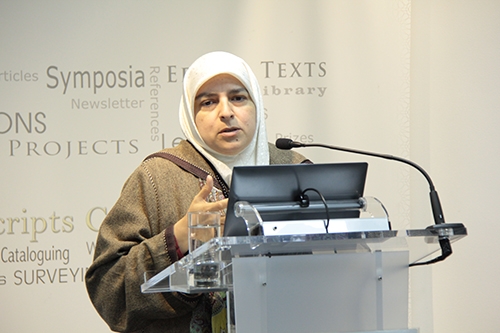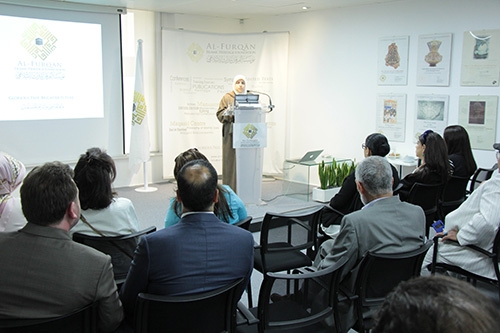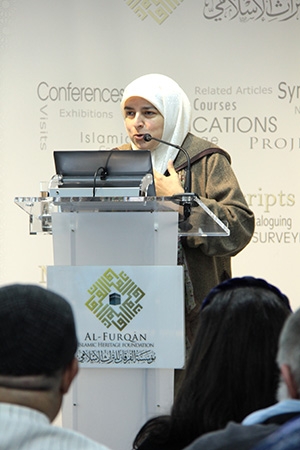In addition to shedding light on the objectives of fasting and how it can transform our understanding of worship and our sense of being, the Centre for the Study of the Philosophy of Islamic Law (Maqasid Centre) at Al-Furqān Islamic Heritage Foundation organised a public lecture titled “The Objectives of Fasting: Reflections on the Meaning”, delivered by Professor Heba Raouf Ezzat. The lecture took place on Friday, 12 June 2015, at the Foundation’s headquarters in London.
Professor Heba Raouf Ezzat began her lecture by emphasising the fact that, to understand the wisdoms and objectives of fasting, we need to approach and look at Islam as one unit, and see it in its totality. She stated that Muslims need to revisit their concepts of Sharīʿah, and that when we examine the five main objectives of Sharīʿah (maqāṣid), we must not ignore the objective of beauty, and how the rituals in Islam should lead to ‘light’ - a term used to describe the Holy Script in the Qurʾān itself. She encouraged the audience, during Ramadan, to try to spot the different concepts related to the notion of Ramadan, and try to track these concepts to see how they interlink with the other rulings of Sharīʿah.

The objectives of fasting
Among many objectives of fasting, Professor Ezzat mentioned the following:
The ‘Preservation of religion’
She explained that this objective is reflected in how people fast and worship God during Ramadan. The exhaustion resulting from night prayers (tarāwīḥ), and abstention from food during the day are not a sign of acceptance; but the presence of God in one’s intention and heart during these actions is fundamental for one’s worship to be sincere. She mentioned the Ḥadīth “…fasting, which is for Me, and I reward it” and the other Ḥadīth “Whoever does not give up false speech and evil deeds while fasting, then Allah is not in need of his leaving food and drink.”
She pointed out that the ‘preservation of the Self’ (Nafs = Self / Spirit) is reflected as well here; because, the remembrance of God in our daily actions emphasises this objective.
The ‘preservation of the intellect’
Ramadan is a month of fasting and a month of prayer i.e. it’s a month of ‘preservation of religion’; it is a month where people focus more on the spiritual, rather than the intellectual. Yet, the process of focusing on the spiritual dimension, and how to understand the Qurʾān, reflect the ‘preservation of intellect’.
‘Protection of wealth’
She pointed out that ‘protection of wealth’ can be by spending it, rather than investing it; and that, what we keep is actually what we spend. Also, re-connecting with God is an essential component of what we have. And we need to ask ourselves what is our capital, in terms of our relationship with God?
The dimensions of fasting
The dimension of the transcendental
When Ramadan comes, the gates of heaven are open and the gates of hell are closed.
The collective dimension of Ramadan
The paying of Zakāt, sharing of food, and giving out of one’s self by joining the community in doing a ritual, and standing next to each other; all this shows the collective dimension of Ramadan. As much as fasting is an individual practice - between an individual and his God, it’s also a social practice.
She also elaborated on how Muslims around the world celebrate Ramadan in different ways, and how the richness and diversity of different cultures affect how we approach Ramadan.

The dimension of bearing witness
Hadith “Whoever does not give up false speech and evil deeds while fasting, then Allah is not in need of his leaving food and drink”.
The dimension of understanding that the Qurʾān was revealed in Ramadan
The Qurʾān is Light and Spirit. Our understanding can benefit during Ramadan: we may absorb and participate in its Light and Spirit.
Reflecting on the Qurʾān
She spoke about how we can look for patterns in the Qurʾān, by exploring different ‘notions’, for example. Justice: following all the verses speaking about justice, you can see that justice is a system of morality; justice in lifetime and justice in the hereafter.
The dimension of the Self
The dimension of the human self can be divided into five other dimensions:
- Bodily (al-abdān)
- Spiritual (al-ʿirfān)
- Emotional (al-wujdān)
- Language (al-lisān)
- Intellect (al-ʿaql)
The human body in Ramadan
In Ramadan, our relationship with our body changes; this is because, essential components of that relationship are missing (eating, exercising, etc.). Fasting understandably creates a distance between one’s self and his body, as it breaks the habit of the body to some extent and opens the habit of the spirit and the heart.
The dimension of desire
The dimension of desire and refraining from sexual relations during fasting is very interesting, because the ‘preservation of lineage (progeny)’ is an objective (maqṣad), yet, you refrain from sexual intercourse during fasting because you need to understand that you have to tame your own desire.
The dimension of time:
It’s very important to understand that the Qurʾān we read is the book that carries the message of God which is eternal, i.e. the dimension of eternity comes into our lives.
The notion of time changes during Ramadan through breaking the routine and through realising that the culmination of the prayer and fasting during Laylat al-Qadr is a new notion of understanding of time… A night we aspire to be forgiven in. The night of Qadr as mentioned in the Qurʾān is better than 1,000 months which is 80 years, and to focus on this night in our prayers and good deeds is similar to a prayer of a lifetime.
The dimension of space
The spaces of Ramadan are very observant, as we frequently go to mosques. People perform Iʿtikāf; so, people are actually changing their location, whilst we are also changing the location of our spirits.
What happens when we fast?
The notion that fasting is to feel the deprivation of the poor is not completely correct, as the poor are obliged to fast during Ramadan themselves. But, it is a reminder that we can lose these bounties God had blessed us with, and refraining from eating and drinking is a training to remember and thank God for these blessings.
Professor Ezzat concluded her lecture by saying that, if a person limits his/her fasting in refraining only from eating and drinking, they shall not be able to reach these multifaceted meanings of Ramadan.

Professor Heba Raouf Ezzat is a lecturer of Political Theory at the Political Science Department at Cairo University, and visiting fellow at The London School of Economics (2015-2016).
She wrote her MA thesis on Women and Politics in Islam, and her PhD on the Concept of Citizenship in Contemporary Anglo-American Liberal Thought. She has also taught as an Adjunct Professor at the American University in Cairo (2006-2013), and as a visiting Professor at the University of Maastricht 2013.
Her most recent work was co-editing the Oxford Encyclopaedia on Islam and Women (2013), and the titles of her two recent books, published in Arabic (2015) were: “The Political Imagination of Islamists” and “Towards a New Civility”.
Her academic interest is multi-faceted and includes: notions of citizenship, multiple modernities, urban politics, sociology of the cyberspace, violence, hegemony and sovereignty, democracy and dialogue, history of Islamic political concepts, and the political implications of informality.

